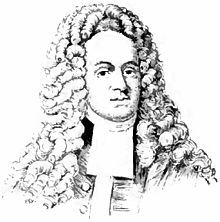Andrew Hamilton (lawyer)
| Andrew Hamilton | |
|---|---|
 |
|
| 18th Speaker of the Pennsylvania House of Representatives | |
|
In office 1729–1732 |
|
|
In office 1734–1738 |
|
| Personal details | |
| Born | c. 1676 Scotland |
| Died | August 4, 1741 Philadelphia, Pennsylvania |
| Spouse(s) | Anne Brown Preeson |
| Profession | Lawyer |
| Signature | |
Andrew Hamilton (c.1676 – August 4, 1741) was a Scottish lawyer in the Thirteen Colonies, where he finally settled in Philadelphia. He was best known for his legal victory on behalf of the printer and newspaper publisher John Peter Zenger. This 1735 decision in New York helped to establish that truth is a defense to an accusation of libel. His eloquent defense concluded with saying that the press has "a liberty both of exposing and opposing tyrannical power by speaking and writing truth."
His success in this case has been said to have inspired the term "Philadelphia lawyer", meaning a particularly adept and clever attorney, as in "It would take a Philadelphia lawyer to get him off." His estate in Philadelphia, known as Bush Hill, was inherited by his nephew, who leased it for use as the vice-president's house during the years that the city was the temporary capital of the United States.
Believed to be born in Scotland about 1676, Hamilton did not talk about his parentage, career, or name in the Old World. At one time he was called Trent, although he returned to his name of Hamilton when Queen Anne came to the throne in 1702. In his address to the Pennsylvania Assembly in 1739, he speaks of "liberty, the love of which as it first drew me to, so it constantly prevailed on me to reside in this Province, tho' to the manifest prejudice of my fortune." Probably Hamilton was his real name, but, for private reasons, he saw fit to discard it for a time.
About 1697, Hamilton came to Accomac County, Virginia, where he continued his study of law and taught a classical school. He later found employment as steward of a plantation owned by Joseph Preeson, one of his former students. After Preeson’s death in 1705, Hamilton continued working the Preeson estate. On March 6, 1706, he married Preeson's widow Ann, daughter of Thomas and Susanna Denwood Brown, who were members of a prominent Quaker family. The marriage is said to have brought Hamilton influential connections, and he began to practice law.
Two years after his marriage, on March 26, 1708, Hamilton purchased from John Toads a 600-acre estate in Maryland known as "Henberry". It was located on the north side of the Chester River in Kent County, Maryland. (The town of Millington, Maryland, was later developed on Henberry's land.) Hamilton also maintained a residence in Virginia, as he drew clients from both colonies.
...
Wikipedia
